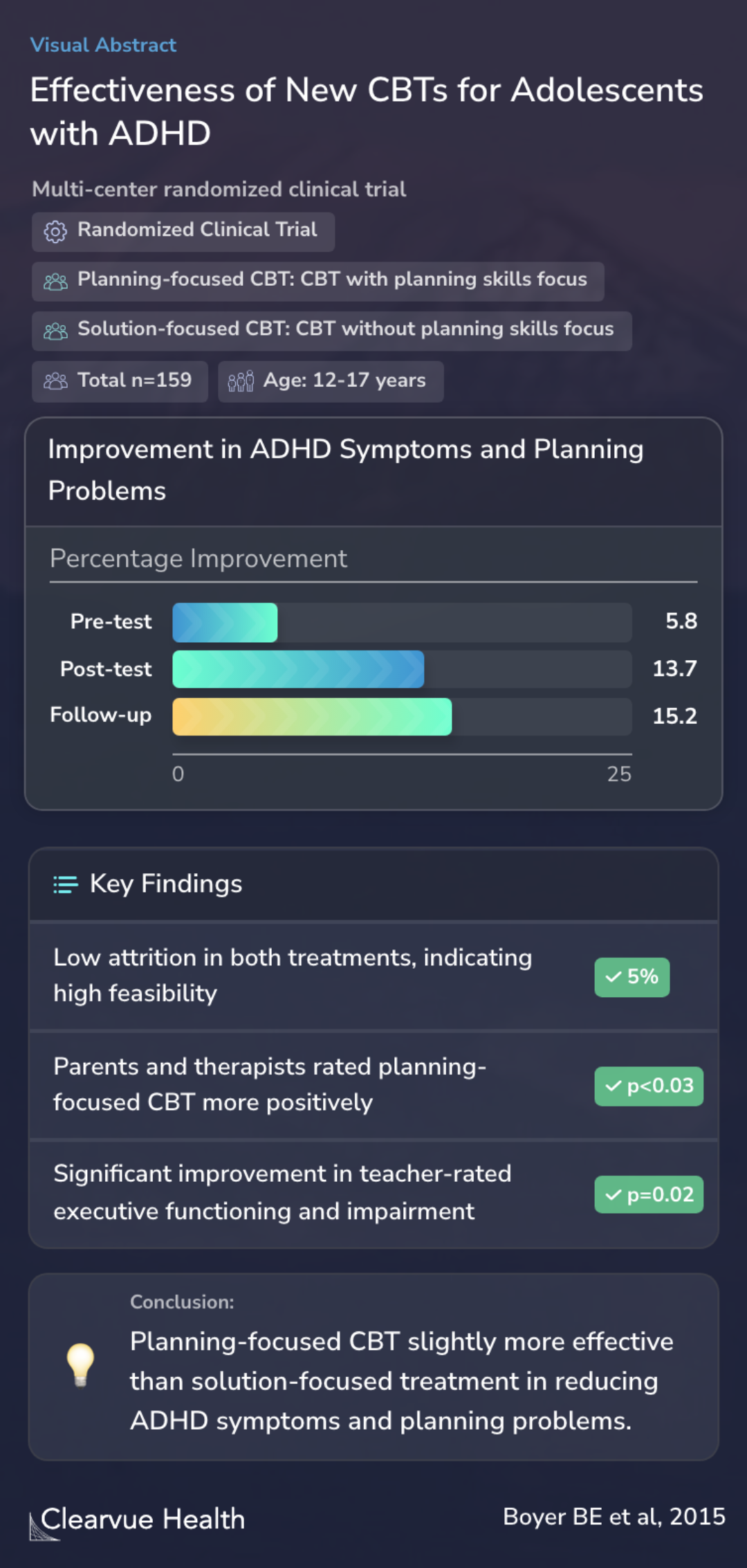Two novel CBTs for adolescents with ADHD: the value of planning skills
Effectiveness of New CBTs for Adolescents with ADHD
Boyer BE, Geurts HM, Prins PJ, Van der Oord S

Objectives
The study focused on a significant issue: adolescents with ADHD often struggle with planning, which can impact their school and social lives. This is a common problem for young people with ADHD, affecting their daily activities and interactions.
Adolescents with ADHD have planning problems, often affecting school- and social functioning.
Methods
In this study, the authors explored the effectiveness of two distinct types of cognitive behavioral therapies (CBT) for adolescents with ADHD. One therapy aimed to improve planning skills, while the other, called solution-focused treatment (SFT), did not have this aim. Both treatments included elements of Motivational Interviewing to help increase the participants' commitment to the therapy.
The study was comprehensive, involving 159 adolescents aged between 12 and 17 years. These individuals were part of a multi-center randomized clinical trial. The researchers collected data at different stages: before the treatment, after the treatment, and three months later. They focused on various aspects, such as ADHD symptoms rated by parents, planning and executive functioning issues, and other related measures.
The effectiveness of two new, individual, short-term cognitive behavioral therapies (CBT) was investigated: One with an aim on improving planning skills and one solution-focused treatment (SFT) without such an aim. Motivational Interviewing elements were added to both treatments to enhan...
Results
The findings of this study were quite encouraging. There was a low dropout rate (only 5%), suggesting that the treatments were manageable and accepted by the participants. Both types of therapy led to significant improvements in ADHD symptoms, as observed in the pre- and post-treatment assessments. These improvements remained or even increased over the three-month follow-up period. This was true even when considering the use of medication. Interestingly, the planning-focused treatment seemed to have a slight edge. Parents and therapists gave more positive evaluations for this treatment compared to the solution-focused treatment. It also resulted in a greater reduction of planning problems as rated by parents.
Attrition was low in both treatments (5%). Adolescents improved significantly between pre- and post-test with large effect sizes on all domains. Improvements remained stable or continued to improve from post-test to follow-up, also when controlling for medication use. Marginally signific...
Conclusions
Summarizing the conclusions of the study, it's evident that both new cognitive behavioral therapies, which incorporated motivational components, were practical and well-received. The low dropout rate is a testament to this. The improvements in ADHD symptoms and related issues from the beginning of the treatment to three months after its completion were significant. Particularly noteworthy is the planning-focused CBT, which not only received more favorable evaluations but also showed marginal additional benefits compared to the solution-focused treatment. This finding is especially important as it highlights the potential of planning-focused CBT in addressing the treatment needs of adolescents with ADHD, a group for whom effective interventions are crucial.
Two new CBTs with integrated motivational components were feasible and attrition was low. ADHD symptoms and co-existing problems of the adolescents improved from pre-test to 3 months after treatment. As the planning-focused treatment was evaluated more positively and had marginal additio...
Key Takeaways
Context
In the realm of ADHD research, various studies have focused on interventions aimed at helping young individuals manage their symptoms and improve their functioning in daily life. The recent study on cognitive behavioral therapies (CBT) for adolescents with ADHD contributes to this ongoing research by exploring new treatment approaches. This study's emphasis on planning skills and solution-focused treatment adds to our understanding of how specific interventions can impact young people with ADHD.
One such related research is a meta-analysis that looked into the effectiveness of Organizational Skills Training (OST) for children with ADHD. This study found that OST significantly improved organizational skills, attention, and academic performance in these children. The importance of such findings lies in demonstrating that targeted interventions, like OST, can substantially aid children with ADHD in crucial areas like academics and organization.
Another study that aligns with this context focused on middle school students with ADHD, specifically examining which homework behaviors best predict school grades. The findings revealed that effective management of homework materials, as rated by parents and teachers, was key to academic success for these students. This underscores the critical role of managing daily tasks and materials in enhancing academic performance for students with ADHD
These studies collectively highlight the importance of targeted interventions in managing ADHD symptoms and improving functional outcomes for children and adolescents. They also provide a broader context for understanding the potential impact of the cognitive behavioral therapies explored in the recent study, especially in areas like planning and executive functioning, which are crucial for academic and daily life success in young individuals with ADHD.